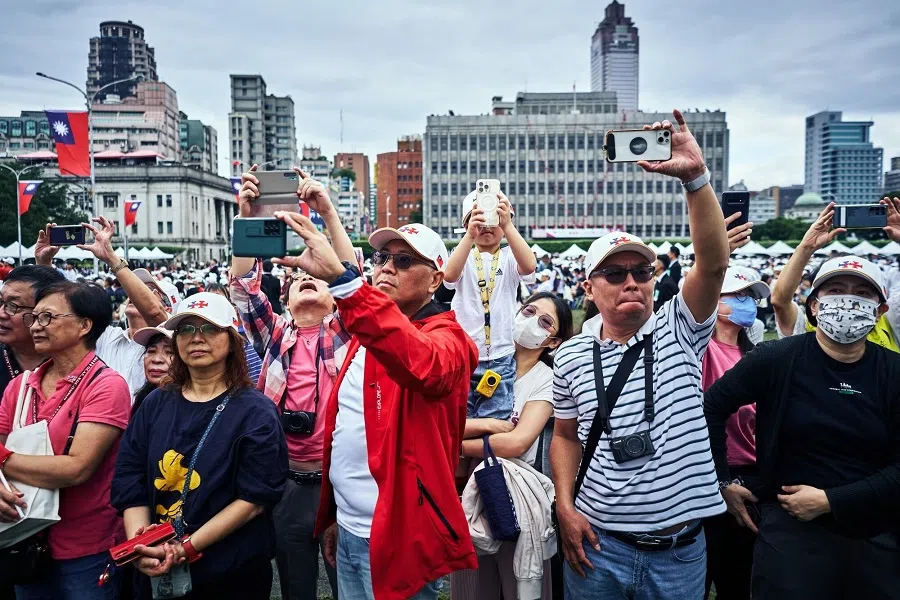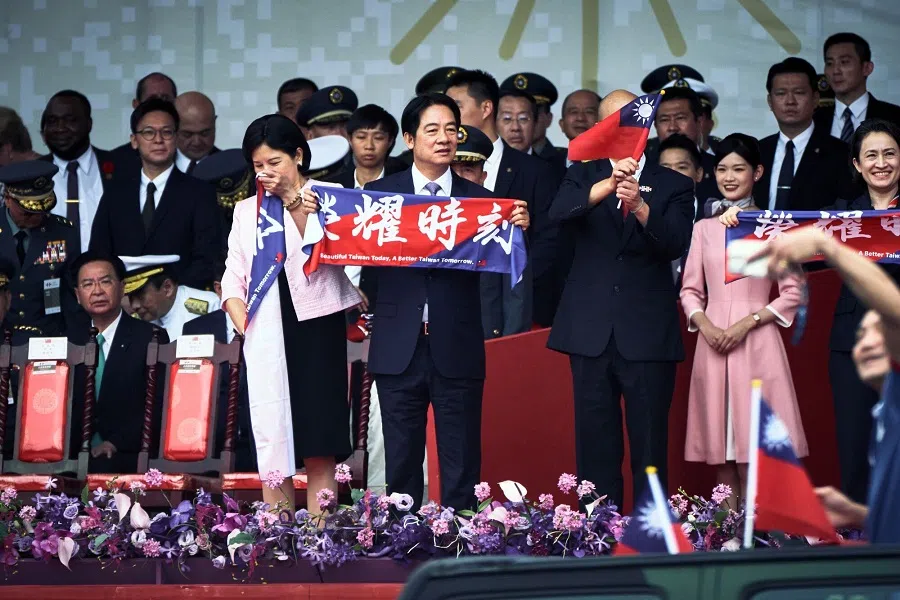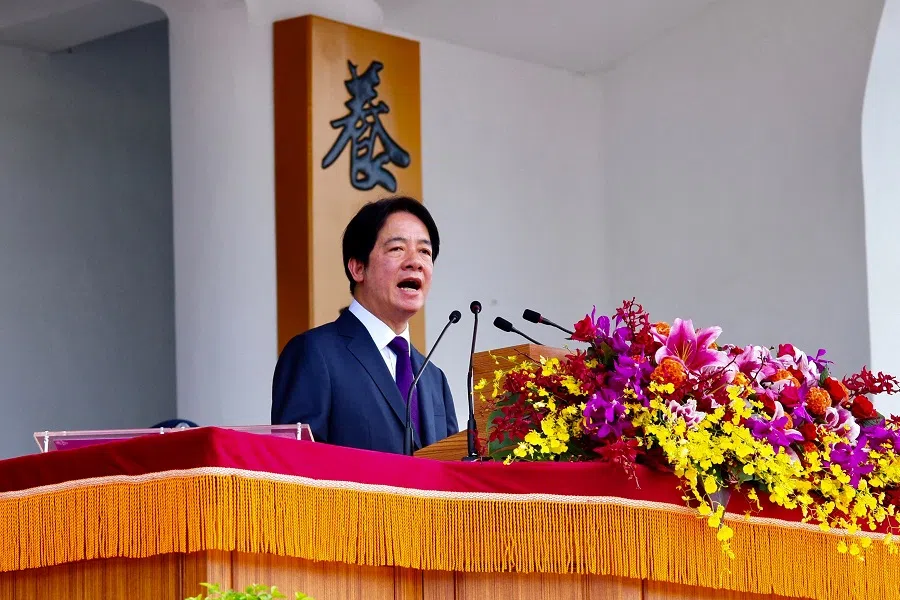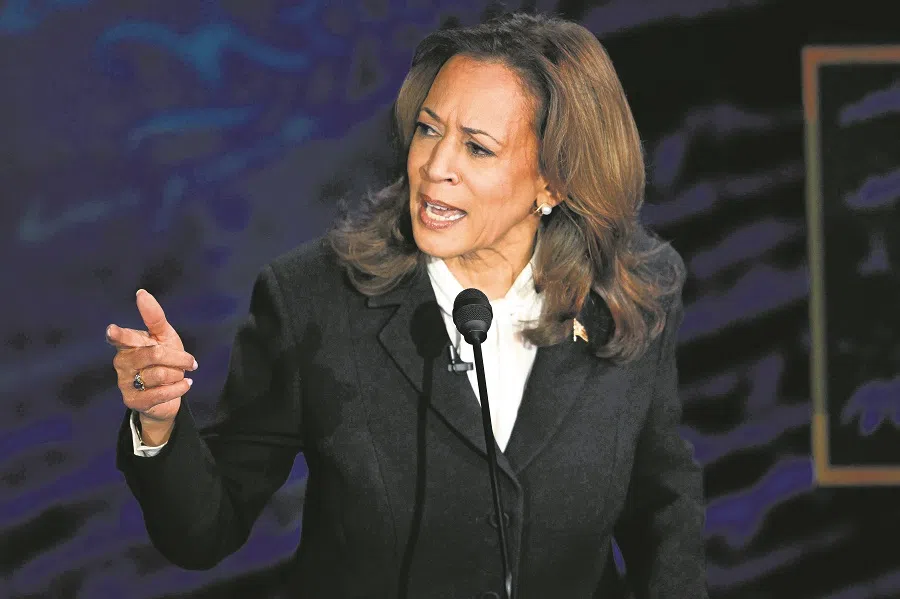[Big read] Lai Ching-te’s ‘two-state theory’: A dangerous brinkmanship?
Lianhe Zaobao journalist Miao Zong-Han notes that Taiwan President Lai Ching-te has departed from the ambiguous cross-strait rhetoric of the Tsai Ing-wen administration, adopting a distinct “one China, one Taiwan” approach.

On 5 October, ahead of Taiwan’s national day celebrations on 10 October, self-proclaimed “pragmatic pro-independence worker” Taiwan President Lai Ching-te said, “It is absolutely impossible for the People’s Republic of China (PRC) to become the ‘motherland’ of the people of the Republic of China (ROC)”. This led to speculation that he would present a stronger stance in his Double Tenth speech.
In the end, however, there were no unexpected statements; he only reiterated that “the ROC and the PRC are not subordinate to each other” and that “the PRC has no right to represent Taiwan”.
‘Lai Ching-te approach’ characterised by ‘one China, one Taiwan’
A closer examination of Lai’s cross-strait remarks since taking office on 20 May reveals that he has intentionally drawn a line with mainland China when discussing Taiwan’s history, defining “the ROC” to refer specifically to Taiwan, Penghu, Kinmen and Matsu, and highlighting the differences in the two systems. This stance effectively breaks from the ambiguity of the past eight years under former President Tsai Ing-wen, presenting a distinctive “Lai Ching-te approach” characterised by “one China, one Taiwan”.
During Tsai’s presidency, she advocated for handling cross-strait relations based on the Constitution of the ROC and the Cross-Strait Act, and did not deny the historical fact of the 1992 cross-strait talks and the principle of seeking common ground while shelving differences.
While she introduced the term “Republic of China Taiwan” in the later stages of her administration and emphasised that “the ROC and the PRC are not subordinate to each other”, her position on cross-strait relations was still somewhat ambiguous.
Looking back over the past eight years, the “Tsai Ing-wen approach” has received general support from the US. Many scholars in mainland China who study Taiwan have privately admitted that, although Tsai’s rhetoric has pro-independence undertones, it is relatively stable and predictable.
Although Lai reiterated Tsai’s assertion of mutual non-subordination in his inaugural speech, he deliberately mentioned the year 1624, when the Dutch East India Company landed in Taiwan, marking Taiwan’s links to globalisation that started from Tainan.
Separation of cross-strait history
During an international press conference amid the primary campaign earlier this year, Lai emphasised that he would continue Tsai’s approach and maintain the status quo, saying that there is no need to declare independence.
Analysts generally believe that Lai’s comments at the time were intended to present a more stable cross-strait policy stance, to ease concerns among the Taiwanese public and even in the US about his pro-independence inclinations.

Although Lai reiterated Tsai’s assertion of mutual non-subordination in his inaugural speech, he deliberately mentioned the year 1624, when the Dutch East India Company landed in Taiwan, marking Taiwan’s links to globalisation that started from Tainan. This has been interpreted as an intentional attempt to sever the historical narrative shared with mainland China.
Zhu Fenglian, a spokesperson for the Taiwan Affairs Office of the State Council of China, criticised this statement at the time, saying that it was full of lies and deceit and utilised a patchwork of information to distort history, fully revealing Lai’s “Taiwan independence” nature.
At the Double Tenth event on 5 October, Lai further asserted, “Therefore, in terms of age, it is absolutely impossible for the PRC to become the ‘motherland’ of the people of the ROC. In fact, for people aged 75 or older in the PRC, the ROC might be their actual homeland.”
On 10 October, he went on to say, “The ROC has already put down roots in Taiwan, Penghu, Kinmen and Matsu.”
... a systematic review of Lai’s statements since taking office reveals that he positions 1949 as the historical point separating Taiwan and the mainland. — Wang Hsin-hsien, Acting Director, Institute of International Relations, National Chengchi University
By the Double Tenth celebration on 10 October, Lai not only reiterated the stance that the “ROC” has taken root in these areas and that the two sides are not subordinate to each other, but also emphasised, “On this land, democracy and freedom are growing and thriving. The PRC has no right to represent Taiwan.”
Wang Hsin-hsien, acting director of the Institute of International Relations at National Chengchi University, told Lianhe Zaobao that a systematic review of Lai’s statements since taking office reveals that he positions 1949 as the historical point separating Taiwan and the mainland.
He believes that Lai aims to convey internally in Taiwan that “the page of past history has been turned” and to strengthen the narrative around the “ROC”. This approach contrasts with Tsai’s presidency, during which historical and cultural connections across the strait were somewhat maintained, thereby clarifying the discourse on cross-strait relations and breaking the previous ambiguity.
Some viewpoints suggest that, for Beijing, there are many types of pro-independence movements, including historical and cultural pro-independence. Lai Ching-te seems to encompass nearly all of these aspects, stopping short of formal legal independence.

Additionally, since Lai took office, the Democratic Progressive Party (DPP) government has adopted a more conservative stance regarding Taiwan people travelling to the mainland, elevating that travel warning to mainland China, Hong Kong and Macau to “orange” in late June, and advising people to avoid non-essential travel.
In September, Taiwanese media reported that several delegations of mainland scholars and university presidents were blocked from visiting Taiwan; a mainland Chinese couple who disrupted an event for Hong Kong residents in Taiwan on 1 October were quickly deported.
Lai’s policies will escalate cross-strait tensions
These hardline policies have raised concerns among the doves within the DPP. Those within the party who advocate cross-strait engagement told Lianhe Zaobao that, despite Lai’s rhetoric emphasising communication, these assertive actions will likely worsen the atmosphere.
Li Zhen-guang, head of the Institute of Taiwan Studies at Beijing Union University, stated in an interview that compared to Lai, Tsai’s cross-strait policy was relatively mild, often adopting an approach of “cultural pro-independence” and “soft pro-independence”. While there are still pro-independence tendencies, “Lai’s stance is more radical, and his sense of division is more entrenched.”
Li believes this makes Lai Ching-te more dangerous than Tsai Ing-wen, and his policies will further intensify cross-strait conflicts.
Strengthening the narrative of mainland military threats
In addition to severing historical and cultural ties, Lai has recently intensified his discourse on the military threat from the mainland, attempting to foster a consensus in Taiwan and highlight the institutional differences across the strait, thereby internationalising the Taiwan issue.
For example, during the centennial celebration of Whampoa Military Academy in Kaohsiung on 16 June, Lai emphasised the need to fight for the survival and development of the ROC and the safety and well-being of the people in Taiwan, Penghu, Kinmen and Matsu.
He added, “The biggest challenge is to face the strong rise of China, which is destroying the status quo across the Taiwan Strait and viewing the annexation of Taiwan and the elimination of the ROC as its national cause,” and asserted that “without Taiwan, there is no ROC”.
China’s intention to attack and annex Taiwan is not because of what any one person or political party in Taiwan says or does, but rather a more profound objective: to change the rules-based international order in the Western Pacific and even the world. — Taiwan President Lai Ching-te

At a memorial ceremony for the 823 Artillery Battle, he added that China’s intention to attack and annex Taiwan is not because of what any one person or political party in Taiwan says or does, but rather a more profound objective: to change the rules-based international order in the Western Pacific and even the world.
Also, with the United Nations (UN) General Assembly convening in late September, the DPP’s legislative caucus actively promoted a resolution asserting that “UN General Assembly Resolution 2758 does not involve Taiwan”. On the day of the General Debate, Lai presented the idea that “democratic Taiwan and authoritarian China are not subordinate to each other” via a video pre-recorded at the Concordia annual summit in New York.
On Lai’s departure from Tsai’s approach, a Green camp insider familiar with cross-strait affairs revealed to Lianhe Zaobao that Lai aims to break through the existing narrative surrounding the cross-strait status quo. “Even if, after the upcoming US elections, Washington and Beijing jointly exert pressure to change the course, at least it would be starting from a new point, which would be an improvement compared with the past.”
In this context, Wang Hsin-hsien infers that before the results of the US elections are announced, both the US and China are likely to refrain from strong reactions in order to maintain stability, suggesting that Lai may be exercising a clear tactic in testing the acceptable limits for Beijing and Washington.
Biden administration concerned about Lai Ching-te
Lai’s actions have not only drawn dissatisfaction from Beijing, but Washington also seems to be expressing doubts about him.
Bonnie Glaser, managing director of the Indo-Pacific Program at the German Marshall Fund of the United States, and Bonny Lin of the Center for Strategic and International Studies, co-authored an article in Foreign Affairs in July, urging the Biden administration to “acknowledge that the tone and content of Lai’s inaugural speech was a departure from those of his predecessors”, and that he has gone too far.
The article recommends that the US encourage Lai to enhance Taiwan’s defence and resilience while also avoiding any actions that could provide Beijing with excuses to escalate pressure.
“We need to make sure that we maintain a ‘one China’ policy, but that includes supporting Taiwan’s ability to defend itself, including what we need to do to ensure the freedom of the Taiwan Strait.” — US Vice-President and Democratic presidential candidate Kamala Harris
Harris may not support sending troops to defend Taiwan
In a further analysis written by Glaser in September, she mentioned that if US Vice-President Kamala Harris were to win the election, she might not echo Biden’s persistent stance that he will send US forces to defend Taiwan if China invades — she could opt instead to return to a more traditional policy of strategic ambiguity and encourage US allies to contribute to bolstering deterrence.
Harris’s comments during an October interview with CBS further support Glaser’s speculation.
She did not provide a clear answer whether she would send troops to defend Taiwan, only stressing, “We need to make sure that we maintain a ‘one China’ policy, but that includes supporting Taiwan’s ability to defend itself, including what we need to do to ensure the freedom of the Taiwan Strait.”
Following Lai’s comments on the “motherland”, Daniel Kritenbrink, US assistant secretary of state for East Asian and Pacific affairs, was asked about the matter on 8 October. He first noted that to understand Lai’s statements, one would need to ask Taipei.

He reiterated that the US’s “one China” policy has not changed, opposing any unilateral actions by either side that would alter the status quo and not supporting Taiwan’s independence. He emphasised that the fundamental US interest is to maintain peace and stability in the Taiwan Strait.
On the eve of Taiwan’s Double Tenth Day, Reuters quoted a US official as saying that Taiwan had briefed diplomatic partners on Lai’s speech, but that the content of his remarks were “entirely up to Taiwan officials”.
... the Biden administration likely harbours doubts about Lai Ching-te, and behind the more moderate tone of Lai’s Double Tenth speech might lie Washington’s concerns. — Chao Chun-shan, Honorary Professor of Diplomacy and International Relations, Tamkang University
In a media briefing on 10 October, a Taiwanese presidential office official said in terms of policy positions, there was a mutual understanding with international allies not to specifically target the Double Tenth Day speech.
However, the official also admitted that since Lai took office, the presidential office has consistently communicated to visiting officials from democratic countries, former officials and think tank delegations that “we will responsibly and steadily maintain peace in the Taiwan Strait”.
Chao Chun-shan, an honorary professor of diplomacy and international relations at Tamkang University, told Lianhe Zaobao that the Biden administration likely harbours doubts about Lai Ching-te, and behind the more moderate tone of Lai’s Double Tenth speech might lie Washington’s concerns.
He believes that Lai would certainly prefer not to be seen as a troublemaker ahead of the US elections, which explains the steady nature of his speech, which is also in line with US interests.
Trump: Taiwan should take on greater responsibility
From the above reactions, it is clear that the current ruling Democratic Party in the US is taking a wait-and-see approach towards Lai Ching-te. However, the Republican Party, which is attempting to regain power, has shown a markedly different attitude towards Taiwan compared with the Trump administration four years ago.
In an interview in June, former US President Donald Trump expressed a lukewarm attitude towards protecting Taiwan from a potential invasion by Beijing, even suggesting that Taiwan should pay the US for its defence.
Glaser’s analysis in September said that if Trump were to win the election, he might more openly urge Taiwan to take additional measures to enhance its defence capabilities, linking Taiwan’s defence spending and policies to US military aid.

Notably, Kelly Craft, who served as the US ambassador to the UN during the Trump administration, emphasised in a speech in Taipei on 12 September that if Trump were to return to power, Taiwan should take on greater responsibility, describing it as “the Poland of the Pacific”. She called for increased defence budgets, the purchase of more offensive weapons, and the expansion of nuclear power generation.
China and the US may cooperate to curb Taiwan independence
Regarding Beijing’s view of how the US elections could impact the situation in the Taiwan Strait, Li Zhen-guang from Beijing Union University said that whether the Democratic Party or the Republican Party wins, the Taiwan issue will remain a significant topic in China-US relations.
He believes that there is considerable room for cooperation between China and the US in curbing Lai’s pro-independence actions. Given the recent circumstances, the US has likely expressed dissatisfaction with Lai’s pro-independence stance, which could help to ease tensions to some extent.
“If Lai takes a critical step down the path of division, the mainland will undoubtedly carry out deterrent actions and retaliate.” — Li Zhen-guang, Head, Institute of Taiwan Studies, Beijing Union University
DPP likely to take a defensive stance
On the potential responses from Beijing following Lai’s Double Tenth speech, Li noted that despite Lai’s escalating pro-independence rhetoric, the mainland will continue to focus on promoting China’s modernisation while also maintaining peace and stability in the Taiwan Strait.
However, he emphasised that the mainland will respond resolutely to any provocations related to Taiwan independence. He said, “If Lai takes a critical step down the path of division, the mainland will undoubtedly carry out deterrent actions and retaliate.”
Wang Hsin-hsien of National Chengchi University assessed that while the mainland will continue its routine military pressure on Taiwan, it is unlikely to escalate to the level of the military exercises surrounding Taiwan that occurred after Lai’s inaugural speech on 20 May.
As for the future direction of Lai’s government, Chao Chun-shan of Tamkang University believes that based on Lai’s Double Tenth speech, the DPP will adopt a defensive stance. This is largely due to the party being in a minority position, facing internal identity issues in Taiwan, a desire to avoid becoming a variable before the US elections, and the lack of mutual trust in official cross-strait communications, along with overall tension between the two sides.
Chao assessed that while the hawkish voices within Lai’s national defence team appear to be suppressed, cross-strait relations are unlikely to improve because of this speech. Instead, it may usher in a new Cold War without gunfire, characterised by “the unstable coexistence of two stable adversaries”.
This article was first published in Lianhe Zaobao as “抛出“新两国论” 赖清德加码 探中美底牌”.





